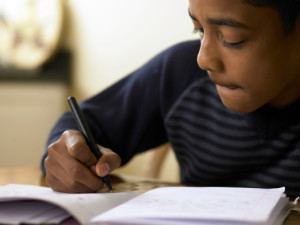It’s nearly midway through the spring semester for many schools. With summer vacation (or even spring break) just a little too far off in the future, it can be hard to keep up the rhythm of daily classes, lessons and homework. It’s commonly a time when parents and teachers start to see their kids lose focus, both inside and outside of the classroom. How do you keep kids (and adults!) interested when there’s still so much of the school year left?
We’ve gathered some collective wisdom on the subject of concentration and offer a few tips here for how to strengthen your focus so that you and your kids can not only thrive in the moment, but play the long game.
Tip #1 – Get your proper amount of sleep.

Too many of us are sleep deprived, especially kids and teenagers. Dr. Kate Land, a Kaiser Permanente pediatrician in Northern California, reminds us that kids ages 6 to 13 should get 9 to 11 hours of sleep a night. Teens need 8 to 10 hours. Getting the proper amount of sleep is vital for performing at our best, reducing stress and reducing our risk of developing chronic illness. To help with concentration, make sleep a priority. Here are a few extra tips to help you get more sleep.
Tip #2 – Reduce sugar and heavy carbohydrate intake.
You are what you eat, the saying goes. And too much sugar and carbohydrate consumption can lead to wild mood swings and energy crashes. Foods that are higher in protein and fatty acids (for example, nuts, fish, avocados) can help sustain us for the long haul. “Protein makes us feel better because it helps to increase the amount of dopamine in our system, which increases alertness, increases concentration and helps improve our reaction time, so it kind of plays into the pleasure and reward system,” explains Kaiser Permanente psychologist Nancy Hoffman, MD. Hear more from Dr. Hoffman in this podcast on food and mood, and get advice for moderating your sugar intake.
Tip #3 – Get plenty of physical activity.
In addition to eating a more healthy and balanced diet, exercise is vital to supporting concentration. Research shows that physical activity can have short-term and long-term benefits on academic performance, memory recall and concentration. When children get more physical activity, they are typically able to vent their feelings and emotions, and be less restless. Regular exercise is also associated with better sleep patterns. Check out our Thriving Schools page with recommendations on how to integrate more physical activity during the school day.
Tip #4 – Focus on short-term goals.
How are you doing with those New Year’s Resolutions you put in place back in January? Sometimes that big science project or exam we have to study for can be overwhelming and lead to procrastination and lack of ability to focus. Setting SMART goals for ourselves can help us put a plan in place that makes the long-term goals more attainable. Don’t get overwhelmed by trying to achieve the big picture or bite off too much too soon. Help your child or student divide big tasks into small ones. Create checklists, plan small rewards or build in smaller more consistent steps that can lead to success.
Tip #5 – Minimize distractions.
Our modern world is awash in stimuli, whether it’s coming from our smart phones, the television and radio, or our busy schedules. Help kids concentrate by reducing distractions. Turn off the TV or radio while kids are studying to help with focus. Don’t allow your child to interact with texts or emails while studying and doing homework. And don’t overschedule classroom time or out-of-classroom time. Too many activities means having to switch gears too fast and too often. Many schools are building in mindfulness meditation practices to help students with concentration. Learn how they’re doing it.
Better concentration and focus are habits that we all can achieve with a little more … focus! These tips can give you a head start to build healthy ways of balancing mind, body and spirit in the classroom, at home and in our daily interactions with one another to help us be in the moment and sustain us for the challenges ahead.




